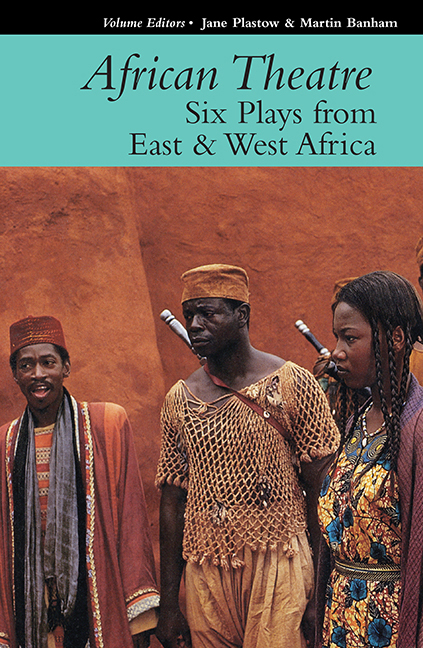Book contents
- Frontmatter
- Contents
- Notes on Contributors
- Obituary: Adieu Alain Ricard
- Preface
- THREE PLAYS FROM EAST AFRICA
- THREE PLAYS FROM WEST AFRICA
- If: A Tragedy of the Ruled
- Ola Rotimi: creating theatrical spaces
- Morountodun
- Morountodun: a retrospective commentary
- The Legend of Wagadu as Seen by Sia Yatabere
- Moussa Diagana & The Legend of Wagadu as Seen by Sia Yatabere: Advocating anarchy in Mauritania?
- Book Reviews
Moussa Diagana & The Legend of Wagadu as Seen by Sia Yatabere: Advocating anarchy in Mauritania?
from THREE PLAYS FROM WEST AFRICA
Published online by Cambridge University Press: 24 August 2019
- Frontmatter
- Contents
- Notes on Contributors
- Obituary: Adieu Alain Ricard
- Preface
- THREE PLAYS FROM EAST AFRICA
- THREE PLAYS FROM WEST AFRICA
- If: A Tragedy of the Ruled
- Ola Rotimi: creating theatrical spaces
- Morountodun
- Morountodun: a retrospective commentary
- The Legend of Wagadu as Seen by Sia Yatabere
- Moussa Diagana & The Legend of Wagadu as Seen by Sia Yatabere: Advocating anarchy in Mauritania?
- Book Reviews
Summary
Moussa Diagana
Moussa Diagana was born in 1946 in the small, relatively isolated town of M'Bout in southern Mauritania. On finishing school he first became a teacher in Nouadhibou, the country's second largest city, before going on to study in the capital, at the University of Nouakchott. Diagana was an exceptional student who progressed to Tunisia for his master's degree (1972-1976) before taking a doctorate in the sociology of development at the University of Paris 1 (1977-1980). An occasional playwright, who has been made Chevalier de l'Ordre des Arts et des Lettres de la R.publique fran.aise, Diagana from 1989 earned his living working for the United Nations Development Programme, mostly in Mali, before more recently moving to the UN Office for Project Services running programmes in the Democratic Republic of the Congo.
La Lénde du Wagadu vue par Sia Yatabéré (The Legend of Wagadu as Seen by Sia Yatabere) was Diagana's second play – his first, the unpublished Le mariage contrarié (The Thwarted Marriage) dating back to 1968. La Légende was written at a time when amateur theatre was becoming enormously popular in the Mauritanian capital. Formal drama, as opposed to rich indigenous oral and performance forms, had been first brought to Mauritania, as to so many other European colonies, via colonial schools. The first Mauritanian play was written only in the 1950s, just a few years before the country voted for independence from France in 1960. Early plays focused on promoting communism and pan-Arab nationalism but, with little state support, theatre was slow to grow. However, in the 1980s and early 1990s a new crop of enthusiastic theatre makers and audiences emerged in the capital. More than a dozen new non-professional companies were established in this period, popular plays regularly sold out, the government built a national theatre and for the first time made a limited investment in theatre training (Rubin, 1999).
This was the context in which Moussa Diagana wrote his 1988 success, staged first by the Dijon-based Franco-Mauritanian company, Theatre de l'Espour, with help from the French Cultural Institute and directed by the French actor and director Patrick La Mauff.
- Type
- Chapter
- Information
- African Theatre 16: Six Plays from East & West Africa , pp. 303 - 310Publisher: Boydell & BrewerPrint publication year: 2017

